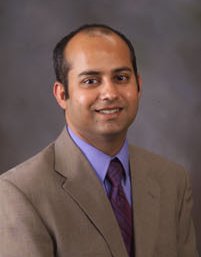Dr. Sandeep K. Shukla
The EurekAlert! article Embedded computers research by Virginia Tech’s Shukla attracts national attention said
“Sandeep Shukla’s work in designing, analyzing, and predicting the performance of electronic systems — particularly embedded computers — has drawn acclaim from the National Academies, the National Science Foundation (NSF), and the White House.The most recent honor for Shukla, an associate professor in the Virginia Tech College of Engineering’s Bradley Department of Electrical and Computer Engineering, is an invitation from the National Academy of Sciences (NAS) to participate in the 19th annual Kavli Frontiers of Science Symposium, Nov. 8–10 in Irvine, Cal.
Shukla, who came to Virginia Tech in 2002, is among a group of about 100 scientists under the age of 45 selected by the NAS in recognition of their research achievements and honors. Since the symposium began in 1989, more than 100 former participants have been elected to the academy and eight have received Nobel Prizes. Signed into being by President Abraham Lincoln in 1863, the NAS is an honorific society of distinguished scholars engaged in scientific and engineering research.”
Sandeep K. Shukla, Ph.D. is Associate Professor of Electrical and Computer Engineering at Virginia Polytechnic and State University in Blacksburg, VA, USA. He is also a founder and deputy director of the Center for Embedded Systems for Critical Applications (CESCA), and director of the FERMAT research lab. He is a senior member of the IEEE, and of ACM, and he has published more than 100 articles in journals, books and conference proceedings. He has coauthored/coedited 4 textbooks.
Sandeep’s research interests include Hardware-software Co-design and Design Automation, Dynamic Power Management, Concurrency Analysis, Networked Embedded Systems, Formal Methods in System Design, and Formal Verification.
He has chaired a number of international conferences and workshops, and edited a number of special issues for various journals. He is on the editorial board of IEEE Design & Test of Computers and IEEE Transactions on Industrial Informatics. He is among the cofounders of the ACM/IEEE International Conference of Formal Methods and Models for Co-Design (MEMOCODE), and the International Workshop on Formal Methods for Globally Asynchronous Locally Synchronous Design (FMGALS). Besides chairing these conferences and workshops, he was also the program co-chair for the International Conference on Applications of Concurrency in System Design (ACSD) in 2007. He served on the program committees of DAC, ICCAD, DATE, HLDVT, and many other design automation related conferences. He also has presented tutorials at DATE, MEMOCODE, VLSI Design, and ICCAD conferences.
Sandeep coauthored Ingredients for Successful System Level Design Methodology and SystemC Kernel Extensions for Heterogeneous System Modeling: A Framework for Multi-MoC Modeling & Simulation (Solid Mechanics and Its Applications), and coedited Formal Methods and Models for System Design: A System Level Perspective and Nano, Quantum, and Molecular Computing: Implications to High Level Design and Validation.
He also coauthored NANOPRISM: a tool for evaluating granularity vs. reliability trade-offs in nano architectures, Evaluating the Reliability of Defect-Tolerant Architectures for Nanotechnology with Probabilistic Model Checking, Efficient Usage of Concurrency Models in an Object-Oriented Co-design Framework, Typing Abstractions and Management in a Component Framework, A Functional Programming Framework of Heterogeneous Model of Computation for System Design, and A Rule-based Model of Computation for SystemC: Integrating SystemC and Bluespec for Co-Design.
He earned his B.S. in Science and Engineering at Jadavpur University, Calcutta, India in 1991, his M.S. in Computer Science, at the State University of New York at Albany, USA in 1995, and his Ph.D. in Computer Science at the State University of New York at Albany in 1997.
Read International research goal: Resilient, sustainable electric power and Virginia Tech’s Shukla received Humboldt Foundation award.
